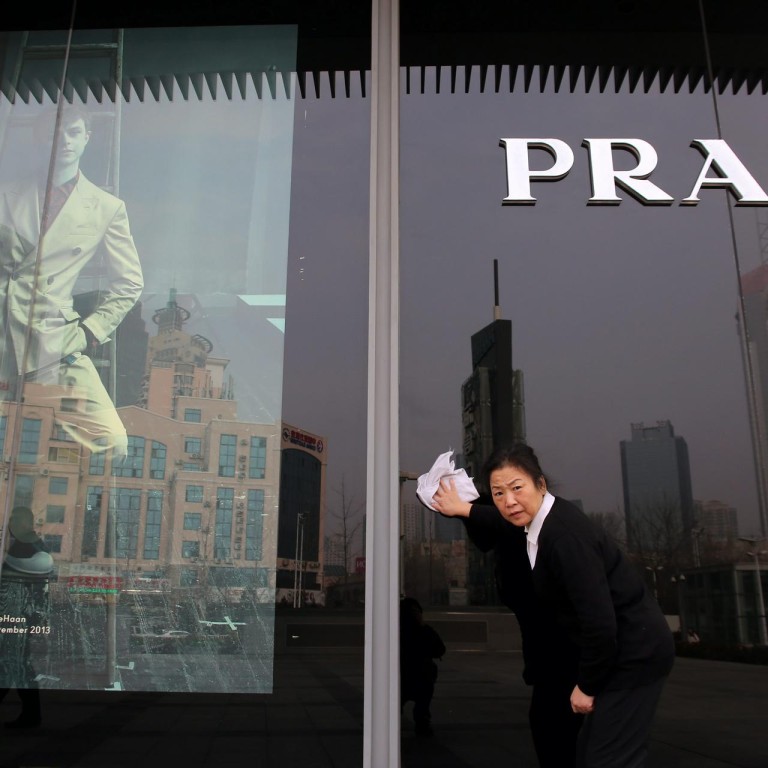
Shanghai outlet centre to promote affordable Italian luxury
Despite mainland crackdown, a property developer is planning a mall in Shanghai devoted to luxury brands, in a bid to redefine the market
Luxury retail is not the most obvious target sector for mainland shopping centre developers in the wake of the Communist Party's crackdown on conspicuous consumption and corruption.
But while the crackdown has slowed growth in luxury retail sales and caused some commercial developers, international brands and shoppers to shun the very term "luxury", some are more upbeat about the sector on the mainland.
Richard Ding, chief executive of Shanghai Zonfa Commercial Management, says a correct reading of the luxury market would help restore confidence in the sector.
"The luxury market is related to design and creativity," he said. "Unfortunately, however, it is synonymous with lavish spending and corruption in China."
Privately owned Zonfa plans to launch the Outletmart, a shopping complex and distribution centre for luxury brands, at Fengjing on the outskirts of Shanghai in the first half of this year.
Online shopping has only had an impact on the [mass-market] physical stores
A joint venture with Italian fashion supplier and wholesaler Firmati & Griffati, the Outletmart, expected to cover more than 15,000 square metres of shopping space, is being touted as an attempt to redefine the mainland luxury market.
Luxury items are not necessarily bought by the super-rich and corrupt officials, Ding said, as most purchasers are members of the mainland's increasingly affluent middle class who are trying to pursue a better life.
His remarks appear to be well-founded.
Global management consultancy McKinsey estimates that a new class of consumer is emerging on the mainland in tandem with increasing disposable income.
Describing them as "new mainstream consumers" whose annual income exceeds 106,000 yuan (HK$134,000), McKinsey predicts that their numbers will jump to 400 million by 2020 as they become the "standard setters for the nation's consumption".
An annual income of more than 106,000 yuan is the level above which family cars and luxury items become affordable, according to McKinsey.
Zonfa also plans to establish an institute to develop mainland fashion designers.
"A developed and healthy luxury market in China will benefit the country's move to push its products up the value chain with excellent designs and creativity," Ding said.
Chinese shoppers, including those from Hong Kong and Macau, were the world's largest buyers of luxury products last year, spending a total of 350 billion yuan, or 29 per cent of the global total, according to consultancy Bain & Co.
Most purchases were made on trips outside the mainland, because such products are nearly 40 per cent cheaper in offshore markets, owing partly to higher mainland import taxes.
China, despite its increasing economic might, has not developed a single established luxury brand, with mainland customers flocking to foreign brands such as Chanel and Louis Vuitton.
On the mainland, a large portion of the spending on luxury products, worth a total 116 billion yuan last year, was for gifting purposes - now deemed a source of bribery and corruption.
Luxury sales growth slowed to 2 per cent on the mainland last year, down from 7 per cent in 2012, as the party's anti-corruption drive got into gear.
Firmati & Griffati chief executive Salvo Spagna promised to bring Italian-made luxury items with the "best prices" - affordable to local shoppers - to the Outletmart.
"I can't tell exactly the price difference between the products here and those in Italy," he said. "But I can guarantee they will be the best Italian-made products to be sold at the best prices in China."
Mainland retail properties are grappling with challenges from the booming e-commerce sector as internet users increasingly buy goods online.
But analysts said luxury products, protected by intellectual property rights, had yet to be affected by e-commerce sites.
Property services firm DTZ said Shanghai's suburbs presented an opportunity for the developers of large shopping centres.
"Commercial streets in downtown areas are reaching saturation point, and the new supply of commercial space will expand to the outskirts of the city," said Duke Zhen, DTZ North China's head of retail.
"Online shopping has only had an impact on the physical stores dealing with mass-market products, such as low-end clothing shops, but it won't bring a sea change to the whole retail industry. Some developers and operators appear to be prepared for the upcoming challenges."

